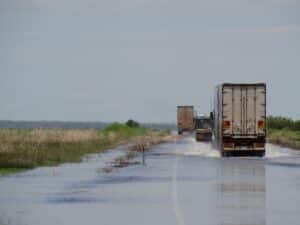
California drivers are responsible for showing extra caution on snowmelt-flooded roads. When they don’t slow down and end up causing a crash that hurts someone, drivers can be held liable.
In some instances, the California Department of Transportation (Caltrans) or a City Transportation Department could also be held responsible for a car accident on flooded roads. Evidence might show that DOT officials didn’t close a road they should have or post warning signs near a known flood hazard.
Drivers shouldn’t have to face the costs of an accident recovery alone after someone’s negligence contributed to a flooded road traffic accident. A California car accident lawyer can protect victims as they heal and make sure a car insurance company doesn’t get away with blaming an accident on mother nature.
Snow Melt Flooding Accident Dangers?
Snowmelt flooding is caused by a build-up of snow in California’s mountainous regions during the winter. As temperatures warm up, all that ice and snow melts and rushes out of the mountains to cause high water conditions in lower elevations.
This is an especially dangerous problem in the Central Valley region of California. In some years, snowmelt from the Sierra Nevada Mountains can bring flooding conditions to places in the San Joaquin Valley like Tulare County, Fresno County, Madera County, Merced County, and Bakersfield and Kern County.
The flooding can damage agriculture and homes, but it can also make travel on local highways and streets treacherous. Drivers may lose control while traveling through standing water to smash into another vehicle. The flow of water may push a careless driver into another vehicle after the driver ignored warning signs. Drivers need to slow down and watch out for standing water when driving during the snowmelt season.
Liability for Drivers After a Snowmelt Flood Car Accident
Some drivers believe that they can’t be held responsible when an accident occurs during bad weather. Reckless drivers could think that mother nature was to blame.
That’s usually not the case when the California Highway Patrol writes up a collision report. California law requires drivers to always travel at speeds “safe for conditions.” This means the posted speed limit might not apply when rain, ice, snow, and flooding are affecting the roadway.
California Vehicle Code 22350 explains the state’s “basic speed law”:
“No person shall drive a vehicle upon a highway at a speed greater than is reasonable or prudent having due regard for weather, visibility, the traffic on, and the surface and width of, the highway, and in no event at a speed which endangers the safety of persons or property.”
When motorists don’t slow down in adverse conditions, they can be responsible for accidents. This applies to drivers deciding to travel on roads affected by snowmelt flooding. They might hydroplane in flood waters and cause a head-on collision. Reckless drivers who continue along at regular speeds might rear-end a vehicle that’s properly reducing speed for high water conditions. The law holds these drivers accountable, regardless of the conditions.
Seeking Compensation from Another Driver After an Accident on Flooded Roads
When this failure to slow down leads to a collision, injured victims can seek recovery compensation from the at-fault driver’s car insurance company.
This compensation can include help with all current medical bills and those bills expected in the months ahead. Victims should receive full reimbursement for the income and benefits they lose while missing work. California flood accident victims must also seek damages for the pain they’ve had to endure. A car accident injury settlement should also factor in the emotional trauma a frightening accident and difficult injury recovery can cause to patients. Money for car repair or replacement must be provided.
Unfortunately, car insurance companies won’t make it easy for you or your family to get the recovery support you need. Insurance adjusters can try to dismiss what an accident report says and shift the blame to an innocent victim. They can also question medical charts and downplay how serious an injury is. Your California car accident lawyer investigates your accident and the other driver and collects evidence to build a strong case for you. Your lawyer would take on an unhelpful insurer to make sure you earned the most support possible.
Filing an Accident Against the California DOT After a Flooding Accident
Drivers injured in flooding car accidents might also be able to show that California’s Caltrans should have acted to protect motorists. The negligence leading to accidents many include transportation departments that fail to close roads that were known to be flooded.
Caltrans or a local city department could be liable for injuries and property damage if they fail to install proper signs on flooded roads warning motorists of dangers.
State and city governments enjoy certain protections from lawsuits over these mistakes. They make it harder to earn help with your recovery if you are injured. The statute of limitations on filing a claim can leave you with a much shorter window in which to act.
If you feel a government department was responsible for your accident involving floodwater, speak to a California car accident lawyer as soon as possible so that you don’t miss important deadlines.
Contact a California Snowmelt Flooding Accident Lawyer
If you or a loved one are hurt in an accident involving snowmelt flood conditions, please contact a California car accident lawyer as soon as possible. If another driver caused your accident, we can help you hold an at-fault driver’s auto insurance company fully responsible for your recovery costs.
Contact Maison Law for a free case consultation. There’s no obligation. It’s a no-risk way to find out what your injury may be worth and how to demand what’s fair from an insurance provider.
